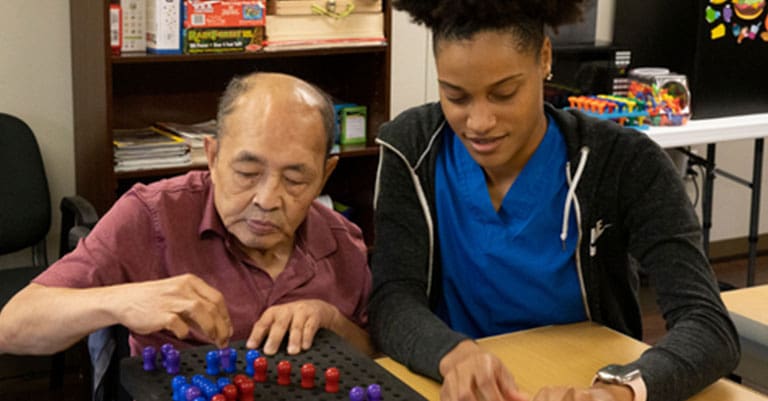Neuropsychological testing focuses on intelligence, attention, memory, language, mood, and personality — to list a few areas. Through these assessments, neuropsychologists assess how the brain functions and identifies strengths and areas of dysfunction. The findings can help make accurate diagnoses, establish competency or diminished capacity, and inform treatment modalities and medication usage.
“Thorough testing helps with neurological localization, or where in the brain there is dysfunction,” said Dr. Shannon Cosentino, Psy.D., Licensed Clinical Neuropsychologist at Nexus Neurorecovery Center. “Doing so helps the rehabilitation team understand where brain pathways need strengthening due to a disrupted pathway versus when compensatory skills need to be learned because of permanent brain damage. Identifying these areas enables our medical team to create personalized treatment plans.”
Neuropsychological testing also provides a better picture and understanding for patients. Dr. Cosentino explained it’s often easier for patients and families to understand why an injured arm may not be able to lift after an injury; however, with the brain, it’s hard to process why an individual is having trouble making progress with recall or vocabulary for example, as it’s a cognitive deficit that is ultimately invisible to the physical eye.
Personalizing Neuropsychology Assessments
A personalized assessment is the first step to effective treatment. The brain controls our bodies, including all muscles, and correctly identifying dysfunction helps establish a baseline and milestones toward recovery.
Dr. Cosentino explained, “You can use neuropsychological testing for many purposes. I often ask referring physicians, ‘What do you want to get out of this?’, so I can structure the evaluation to help them reach their goals. For example, one physician wanted to target a specific part of the brain. We used testing to identify the weakened pathway so that he could appropriately prescribe medication.”
Neuropsychological Evaluations for Children
Neuropsychological evaluations are a valuable tool for children and adolescents, regardless of the reason they’ve arrived at Nexus Children’s Hospital. Sometimes, patients arrive with many diagnoses from multiple clinicians — some of which the Nexus team questions based on evaluations. Neuropsychological evaluations help health care providers determine if there was a misdiagnosis before proceeding with a plan of care.
Cosentino shared, “These multiple and often incorrect diagnoses can have repercussions when patients need rehabilitation or specialty care. A patient may have been misdiagnosed with ADHD or an intellectual disability that could alter the course of care.”
Additionally, diagnoses also affect insurance coverage, and some facilities may even turn patients away if they aren’t equipped to manage certain diagnosis. For example, there is a major issue in the United States currently where children and adolescents cannot find a provider to treat and support their medical and behavioral needs. Neuropsychological evaluations are vital in this scenario, as they can confirm or disprove a diagnosis, leading to accurate and better care for the patient.
Neuropsychological Evaluation Logistics
Inpatient and outpatient referrals benefit from personalized assessments, and the testing methods vary depending on the individual. Inpatient individuals are usually quite ill, and testing will be broken up into four or five sessions lasting two to three hours each, which gives the patient an opportunity to rest and not become too taxed mentally or physically. Individuals seen as outpatients are typically more high functioning and better able to withstand in-depth assessment, so testing may be accomplished in a three-to-four-hour session.
At Nexus Neurorecovery Center, our neuropsychology team takes a personalized approach to each individual and where they are in their recovery journey. Members of our team are specially trained in conducting effective assessments and building appropriate care plans.
Explore our facilities and programs on our website, and contact our admissions team to schedule a meeting or referral.
